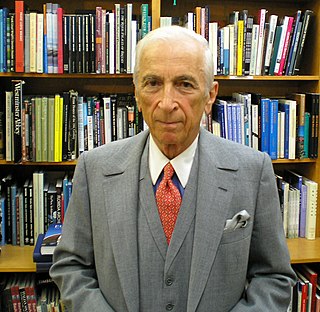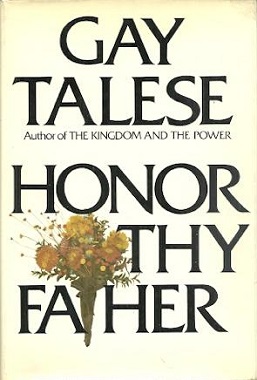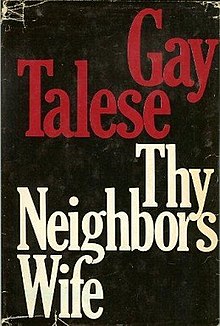
The sexual revolution, also known as the sexual liberation, was a social movement that challenged traditional codes of behavior related to sexuality and interpersonal relationships throughout the Western world from the 1960s to the 1970s. Sexual liberation included increased acceptance of sex outside of traditional heterosexual, monogamous relationships. The normalization of contraception and the pill, public nudity, pornography, premarital sex, homosexuality, masturbation, alternative forms of sexuality, and the legalization of abortion all followed.

Nachem Malech Mailer, known by his pen name Norman Kingsley Mailer, was an American novelist, journalist, playwright, filmmaker and actor. In a career spanning over six decades, Mailer had 11 best-selling books, at least one in each of the seven decades after World War II.

Alexander Comfort was a British scientist and physician known best for his nonfiction sex manual, The Joy of Sex (1972). He was an author of both fiction and nonfiction, as well as a gerontologist, anarchist, pacifist, and conscientious objector.
"New Queer Cinema" is a term first coined by the academic B. Ruby Rich in Sight & Sound magazine in 1992 to define and describe a movement in queer-themed independent filmmaking in the early 1990s.

Lesbian feminism is a cultural movement and critical perspective that encourages women to focus their efforts, attentions, relationships, and activities towards their fellow women rather than men, and often advocates lesbianism as the logical result of feminism. Lesbian feminism was most influential in the 1970s and early 1980s, primarily in North America and Western Europe, but began in the late 1960s and arose out of dissatisfaction with the New Left, the Campaign for Homosexual Equality, sexism within the gay liberation movement, and homophobia within popular women's movements at the time. Many of the supporters of Lesbianism were actually women involved in gay liberation who were tired of the sexism and centering of gay men within the community and lesbian women in the mainstream women's movement who were tired of the homophobia involved in it.

Gaetano "Gay" Talese is an American writer. As a journalist for The New York Times and Esquire magazine during the 1960s, Talese helped to define contemporary literary journalism and is considered, along with Tom Wolfe, Joan Didion and Hunter S. Thompson, one of the pioneers of New Journalism. Talese's most famous articles are about Joe DiMaggio and Frank Sinatra.
David Thorstad was an American political activist who co-founded or ran a number of homosexual rights groups following the Stonewall riots in 1969, including as a former president of New York's Gay Activists Alliance. He later engaged in pedophilia and pederasty activism with the North American Man/Boy Love Association (NAMBLA), of which he was a founding member.

Valerie Martin is an American novelist and short story writer.

Making Love is a 1982 American drama film directed by Arthur Hiller and starring Kate Jackson, Harry Hamlin and Michael Ontkean. The film tells the story of a married man coming to terms with his homosexuality and the love triangle that develops between him, his wife and another man.

Jeremy Slate was an American film and television actor, and songwriter. He is best known for Larry Lahr in The Aquanauts (1960–1961), Chuck Wilson in One Life to Live (1979–1987) and as Deputy Sheriff Ben Latta in The Sons of Katie Elder (1965).
Sandstone Retreat, officially the Sandstone Foundation for Community Systems Research, was a clothing-optional, open sexuality resort for swingers located at Sandstone Ranch, a 15-acre (6.1 ha) estate in the Santa Monica Mountains overlooking Malibu and the Pacific Ocean.

Honor Thy Father is a 1971 book by Gay Talese, about the travails of the Bonanno crime family in the 1960s, especially Salvatore Bonanno and his father Joseph "Joe Bananas" Bonanno.

Marguerite Diane Webbera.k.a.Marguerite Empey was an American model, dancer and actress.

The Homosexual Matrix is a book by American psychologist Clarence Arthur Tripp, in which the author discusses the biological and sociological implications of homosexuality, and also attempts to explain heterosexuality and bisexuality. The book was first published in 1975 by McGraw-Hill Book Company; it was republished in a revised edition in 1987. Based on his review of the evidence, Tripp argues that people do not become homosexual due to factors such as hormone levels, fear of the opposite sex, or the influence of dominant and close-binding mothers, and that the amount of attention fathers give to their sons has no effect on the development of homosexuality. He criticizes Sigmund Freud and argues that psychoanalytic theories of the development of homosexuality are untenable and based on false assumptions. He maintains that sexual orientation is not innate and depends on learning, that early puberty and early masturbation are important factors in the development of male homosexuality, and that a majority of adults are heterosexual because their socialization has made them want to be heterosexual. He criticizes psychotherapeutic attempts to convert homosexuals to heterosexuality and argues in favor of social tolerance of homosexuality and non-conformist behavior in general.
The LGBT community in London is one of the largest within Europe. LGBT culture of London, England, is centred on Old Compton Street in Soho. There are also LGBT pubs and restaurants across London in Haggerston, Dalston and Vauxhall.

The Homosexualization of America, The Americanization of the Homosexual is a 1982 book about LGBT rights in the United States by the gay rights activist Dennis Altman, in which the author discusses the emergence of gay people as a minority group. The book received positive reviews, crediting Altman with providing a useful discussion of gay people in the United States.
Thy Neighbor's Wife may refer to:
Queer art, also known as LGBT+ art or queer aesthetics, broadly refers to modern and contemporary visual art practices that draw on lesbian, gay, bisexual, and transgender+ imagery and issues. While by definition there can be no singular "queer art", contemporary artists who identify their practices as queer often call upon "utopian and dystopian alternatives to the ordinary, adopt outlaw stances, embrace criminality and opacity, and forge unprecedented kinships and relationships." Queer art is also occasionally very much about sex and the embracing of unauthorised desires.
Parents' Day is a 1951 novel by Paul Goodman. Written as autobiographical fiction based on the author's experiences teaching at the upstate New York progressive boarding school Manumit during the 1943–1944 year, the book's narrator grapples with his homosexuality and explores a series of sexual attractions and relationships that culminates in his being fired by the school. Goodman wrote the novel as part of a Reichian self-analysis begun in 1946 to better understand his own life. He struggled to find a publisher and ultimately self-published through a friend's small press. Reviewers remarked on unease in Goodman's sexual revelations, lack of self-awareness, and lack of coherence in the text. Parents' Day sold poorly and has been largely forgotten, save for some recognition as an early gay American novel.












